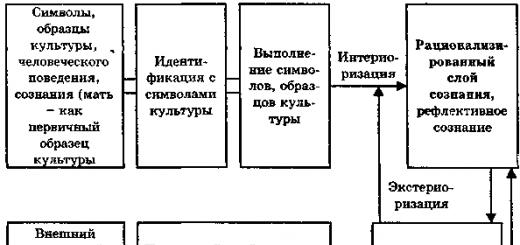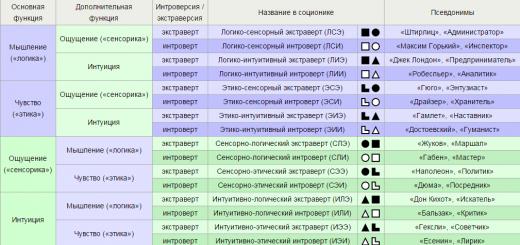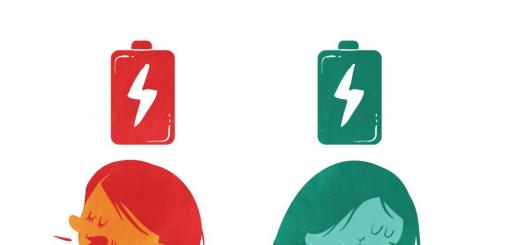The ideals of personality development presuppose the existence of freedom, the desire for which and the experience of which is an integral characteristic of the personal way of being. Moreover, according to Vygotsky, development and freedom have an organic connection, even unity: a person develops in the sense that he himself decides how to be. For this decision, he needs cultural means (to have information, to be educated). If I am educated and use these tools for decisions, then I develop and free myself from the compulsion of the actual situation. If so, then a developed personality and a free personality are one and the same.
Three global topics can be named, touching on which in psychological assistance can exhaust almost all the variety of human problems and difficulties with which people turn to psychotherapists. This is freedom, love and the finiteness of our life. In these deepest experiences of ours lies both a huge life potential and an inexhaustible source of anxiety and tension. Here we dwell on one of the components of this triad - the theme of freedom.
The most positive definition of freedom can be found in Kierkegaard, who understood freedom primarily as a possibility (English possibility). The latter concept comes from the Latin word "posse" (to be able), which also forms the root of another important word in this context - "strength, power." So, if a person is free, he is mighty and powerful, i.e. possessing strength. As May writes, when we talk about possibility in connection with freedom, we first of all mean the ability to want, choose and act. All this together means the possibility of change, the realization of which is the goal of psychotherapy. It is freedom that provides the necessary strength for change.
In psychological assistance, the theme of freedom can sound at least in two main aspects.
1. Firstly, as a component of almost all the psychological difficulties with which clients come to us, because the nature of our relationships with other people, the vision of our place and opportunities in the living space depends on a specific (by no means philosophical), individual understanding of freedom. The subjective understanding of freedom is especially manifested in those life situations where we are faced with the need to choose. Our life is woven from choices - the choice of actions in elementary situations, the choice of words to answer another, the choice of other people and the nature of relations with them, the choice of short-term and long-term life goals, and finally, the choice of values that are our spiritual guidelines in life. How free or limited we feel in such everyday situations depends on the quality of the emerging life.
Clients bring to the psychologist not only their own understanding of the issue of freedom in their lives, with all the ensuing consequences from this understanding. Clients' understanding of freedom is directly reflected in the process of psychotherapy, it colors the therapeutic relationship between therapist and client. Therefore, one can speak of the freedom of the client in therapeutic contact, the nature of the construction of which on the part of the client serves as a miniature model of his difficulties. On the other hand, in psychotherapy, the freedom of the client collides with the freedom of the therapist, who has his own understanding of freedom and how to use it in therapeutic meetings. In a therapeutic relationship, the therapist represents the reality of life, the external world, and in this sense serves as a kind of reservoir of freedom for the client, providing certain opportunities and imposing certain restrictions in contact. Thus, the theme of freedom is also an important part of the process of formation and development of the therapeutic relationship.
Freedom, being the main existential value, is at the same time the source of many of our life's difficulties and problems. The essence of many of them lies in the diversity of subjective ideas about freedom.
Often people, including some of our clients, tend to think that we can truly experience freedom only in the absence of any restrictions. This understanding of freedom as "freedom from" (Frankl) can be called negative freedom. Probably, everyone at some time in their experience could be convinced of what it means to choose something of their own for themselves, without taking into account the same freedom of choice of other people (including the freedom to somehow relate to my freedom), not taking into account internal and external restrictions. It is hardly possible to speak of real and concrete human freedom, and not abstract philosophical freedom, outside the world of structured relationships and mutual obligations. One can imagine what would happen on city streets if everyone suddenly began to ignore the rules of the road. The psychotherapist has the opportunity to constantly be convinced of what the self-will, anarchist attitude of clients to their own and others' rights, to their own and others' freedom lead to.
Negative freedom also leads to feelings of isolation and loneliness. After all, it is known that the more freedom we take away for ourselves, ignoring the real interconnectedness with others, the less attachments and healthy dependence on others remain, which means more loneliness and emptiness.
For the emergence of real freedom in life, it is necessary to accept the fact of the existence of fate. In this case, following May, we call fate the integrity of limitations: physical, social, psychological, moral and ethical, which can also be called “givens” of life. Therefore, in psychological assistance, when we think and talk about freedom, we mean situational freedom, when the freedom of each of our choices is determined by the possibilities and limitations imposed by a specific life situation. Sartre called this "the factuality of the human situation", Heidegger - the condition of "abandonment" of a person into the world. These concepts reflect the fact that our ability to control our existence is limited, that some things in our life are predetermined.
First of all, existence itself as a space for life-creation is limited in time. Life is finite and for any human actions and changes there is a time limit.
In the words of Gendlin, “...there is facticity, situation and conditions that we cannot give up on. We can overcome situations by interpreting and acting on them, but we cannot choose them differently. There is no such magical freedom to simply choose to be different from what we are. Without difficult, strenuous steps, we cannot become free from the limitations that have been placed on us.”
On the other hand, any life situation has a certain number of degrees of freedom. Human nature is flexible enough to be free to choose its own ways of acting in life, regardless of all kinds of limiting circumstances and conditions. We can say that freedom means a constant choice between alternatives and, more importantly, the creation of new alternatives, which is extremely important in a psychotherapeutic sense. Sartre spoke very categorically: "We are doomed to choose ... Not to choose is also a choice - to give up freedom and responsibility."
People, including those who turn to a psychologist, often confuse open possibilities and limiting necessity. Clients who are dissatisfied with their work or family life often view their situation as hopeless, irreparable, placing themselves in the position of a passive victim of circumstances. In reality, they avoid choice, and therefore freedom.
In this regard, one of the main goals of existential therapy can be considered to help the client understand:
- 1. to what extent does his freedom to change something in the present life situation extend,
- 2. in what his difficulties are not resolved at the present time,
- 3. in what he himself limits himself, interpreting his situation as insoluble and putting himself in the position of a victim.
May called the goal of any psychotherapy the desire to help the client free himself from the restrictions and conditionings he himself created, helping to see ways to escape from himself by blocking his opportunities in life and creating extreme dependence on other people, circumstances, and his ideas about them.
Thus, freedom in the context of personality psychology, psychological assistance, we can imagine as a combination of opportunities and limitations in a particular life situation for a particular person at the present time. We can talk about freedom to the extent that we recognize or realize what is impossible, what is necessary and what is possible. This understanding helps to expand the vision of one's life by analyzing the possibilities and limitations - both external and internal - in a particular life situation.
Awareness of one's freedom is accompanied by an experience of anxiety. As Kierkeggard wrote, "anxiety is the reality of freedom—as a potentiality that precedes the materialization of freedom." Quite often people come to a psychotherapist with an "internally chained slave" and in the process of psychotherapy they have to "grow up to freedom." This causes great anxiety, as well as the appearance of any new, unusual sensations, experiences, situations, the meeting with which carries unpredictable consequences. Therefore, many clients of psychotherapy for a long time trample on the threshold of the desired psychological and life changes, not daring to step over it. It is difficult to imagine any changes without a certain inner emancipation, liberation. Hence, in psychological practice, a frequently encountered paradox is the coexistence in one person of the awareness of the need for change and the desire not to change anything in a suffering, but settled life.
By the way, after the effective help of a psychologist, clients often leave with more anxiety than they came, but with a qualitatively different anxiety. It becomes a source of acute experience of the passage of time, stimulating the constant renewal of life.
According to Jaspers, “... boundaries give birth to my self. If my freedom runs into no boundaries, I become nothing. Through limitations, I pull myself out of oblivion and bring myself into existence. The world is full of conflict and violence that I must accept. We are surrounded by imperfections, failures, mistakes. We are often unlucky, and if we are lucky, then only partially. Even when doing good, I indirectly do evil, because what is good for one may be bad for another. All this I can accept only by accepting my limitations. Successfully overcoming the obstacles that stand in the way of building a free and realistic life, and resigning ourselves to insurmountable obstacles, give us a sense of personal strength and human dignity.
The concept of "freedom" is often found next to the concepts of "resistance", "rebellion" - not in the sense of destruction, but in the sense of preserving the human spirit and dignity. It can also be called the ability to say “no” and respect for your “no”.
Most often, when we talk about freedom, we mean the ability to choose ways to act in life, “freedom to do” (Mei). From a psychotherapeutic point of view, freedom, which May called "essential" freedom, is extremely important. It is the freedom to choose your attitude towards something or someone. It is essential freedom that is the basis of human dignity, since it is preserved under any restrictions and depends not so much on external circumstances as on internal disposition. (Example: the old woman is looking for her glasses, which she has on her nose).
But no matter how much freedom we have, it is never a guarantee, but only a chance for the implementation of our life plans. This should be borne in mind not only in life, but also in psychological practice, so as not to create others instead of some illusions. It is unlikely that we and our clients can ever be completely sure that we use freedom in the best possible way. Real life is always richer and more contradictory than any generalized truths, especially those obtained with the help of psychotherapeutic manipulations and techniques. After all, any of our truths are most often just one of the possible interpretations of life situations. Therefore, in psychological assistance, one should help the client to accept a certain conditionality of the choices he makes - their conditional truth regarding a specific time and specific life circumstances. This is the condition of our freedom.
Subjectivity is a way of experiencing a person's freedom. Why is that?
Freedom and responsibility, the phenomenon of flight from freedom (according to Fromm).
To the question of the definition of "personal autonomy" based on the understanding of freedom in the philosophical and psychological aspects
Ezhevskaya Tatyana Innokentievna,
Candidate of Pedagogical Sciences, Professor of the Department of Chamber of Commerce and Industry,
Starnovskaya Ekaterina Evgenievna,
graduate student.
Transbaikal State Humanitarian and Pedagogical University named after V.I. N. G. Chernyshevsky.
Man is a social being and inevitably, in the course of his life, when interacting with other people, he has to resort to limiting his own desires and reckon with the reality around him. However, regardless of the limitations present in his life, a person strives for independence, independence, personal autonomy.
In the scientific literature, personal autonomy is understood as a certain degree of freedom of action of a person in making decisions regarding the performance of tasks and control. In addition, autonomy is defined as one of the strong desires to act independently, to control the physical and social environment, to be competent and successful. From our point of view, human autonomy is based on personal freedom, self-government, sovereignty, independence, responsibility, self-confidence, etc. Being an “inner core”, it allows a person to remain committed to his own views, positions, norms and values.
A review of the scientific literature showed that the concept of personal autonomy is somehow connected with the concept of freedom. A.V. Petrov calls these two concepts synonymous, pointing out their equivalence, and the ideas and approaches of different authors regarding the "autonomy of the individual" agree that autonomy is freedom in actions and motives, or some kind of them is not freedom, or both. other together . The World English Dictionary defines autonomy as freedomtodetermineone "sownactions, behavior, etc", which means "freedom to determine one's own actions, behavior, etc." Grace Craig and Don Bokum also argued that autonomy is a person's freedom of action in making decisions regarding the fulfillment of tasks and control, which largely determines the sense of his responsibility... E. Berne understood by autonomy "the same as freedom from the scenario", saying that a person has the right to freely decide which "scenario" he should live . Thus, the definition of personal autonomy is based on the concept of freedom, which in turn is its synonym or is an equivalent definition.
Synonymy, equivalence of the concepts of autonomy of the individual and freedom determined the expediency of considering the "autonomy of the individual" through the prism of understanding freedom in the philosophical and psychological aspects.
Scientists, philosophers and psychologists do not have an unambiguous approach to understanding freedom. So, for example, Blessed Augustine (354 - 430), under freedom understood divine predestination, and a person’s life, his actions and actions are predetermined from above and as such, a person does not have freedom.
B. Spinoza (1632 - 1677) held a different point of view, saying that freedom exists and this is not God's predestination, but the result of a person's hard work in reality - an ability that appears and develops due to human activity. After all, freedom is known by man in connection with the existence of the conditions for the possibility of this freedom. From his point of view, “freedom is the liberation from the slavish dependence of a person on external circumstances, but not on them in general .... And, conversely, dependence on the universal connection of things, acting in accordance with them ... ". Based on what B. Spinoza said, it can be assumed that human freedom still exists, and it is associated with personal activity, seeking to overcome slavish dependence on various circumstances, conditions and moves towards the goal or the need that a person has.
For I. Kant, a person is both free and subject to natural laws. In his writings, the modern concept of human autonomy originates, which includes a combination of dependence and at the same time independence. The philosopher notes that "one and the same thing is both free (as a thing in itself) and not free (as a phenomenon)." Freedom is inherent in a rational subject who is aware of his ability to act based on reason. Man, being a rational being, acts according to the laws of reason, therefore - he is free, at the same time he is subject to natural laws, for example, the law of gravity. According to I. Kant, in the case “if it were possible to scientifically study all the reasons that prompt me to act this way and not otherwise, then this will not turn me into an unconscious automaton, will not deprive me of the consciousness of my freedom as a rational being.”
The thoughts of I. Kant formed the basis of future concepts. So, Karl Marx, defining freedom, said that a person is limited in his freedom, since the conditions of reality already in themselves largely determine the range of his aspirations, interests, claims, etc. Nevertheless, a person has sufficient freedom in determining the purposefulness of his activity, because. there is not one, but several ways to develop it. Consequently, human freedom is not absolute and is embodied in the form of choosing a specific goal and plan of action. Therefore, the general idea of the scientist is that freedom is primarily manifested “not in independence” from external circumstances, the laws of nature and society, but in the ability to reasonably choose among the many ways of behavior that is necessary, while placing enormous moral and social responsibility on freedom. .
R. Steiner solves the issue of freedom in his own way in the book "Philosophy of Freedom". The basis of his concept is an appeal to the freedom of human consciousness. The author believes that it is not the brain that automatically thinks, but the process of thinking includes a free consciousness, autonomous from the rules, terms and their components, which, regardless of our will, arise in our brain and give standard assessments of what is happening. Therefore, according to Steiner, real freedom is determined by the emancipation of her thoughts, since. only thinking is able to cognize reality, which means that in the process of thinking, a person is completely independent of external circumstances.
Another thinker, philosopher and psychologist V. Frankl, considering freedom, says that a person is not free from both external and internal circumstances, but these circumstances do not completely determine him. A person's behavior is influenced by various factors, but a person is able to take a certain position in relation to them, because. behavior is determined, first of all, by the values and meanings of a person. “At the end of the day, man is not subject to the conditions he faces; rather, these conditions are subject to his decision. The main idea of V. Frankl's views is freedom as a position. Even when a person is under the influence of his immediate need, he can determine his behavior by accepting or not accepting it, thereby expressing the person’s ability to take one or another position in relation to something.
Scientists - psychologists also paid special attention to freedom. The first to raise the question of freedom was E. Fromm. In his opinion, a person is independent in deciding the issue of his freedom, and it depends only on him to accept it or refuse it. Relying on rational considerations, a person makes a choice either in favor of free action, or in favor of giving up freedom. Continuing to develop his ideas, E. Fromm points to the inextricable link between freedom and responsibility. The scientist notes that human freedom is based on awareness and understanding of the situation and is associated with the possibility of choice, which means that a person is responsible for it. “The decision is up to the individual. It depends on his ability to take himself, his life and happiness seriously; it depends on his readiness to solve both his own moral tasks and the moral tasks of his society. It finally depends on his courage to be himself and live for himself.
In humanitarian psychology, G. Allport paid attention to the issue of freedom. He considered freedom in direct relationship with the individual. He defined personality as a certain entity that is in the process of continuous change and formation. He called such a person "mature", which means free, demonstrating emotional non-concern and self-acceptance. According to G. Allport, a “mature personality” is a person who has freedom in an emotional aspect, i.e. tolerance towards oneself, towards one's shortcomings and others, since one is able to independently manage one's own emotions. However, we believe that in this understanding, the presented point of view of the formation of personal freedom is quite idealized, since, as the author himself admits, not every adult reaches this “maturity”.
Freedom became the subject of study in existential psychology. R. May, for example, considers freedom as a person's awareness of his capabilities. In his opinion, a person is in a state of constant fluctuations between two poles: an active subject and a passive object. This creates the potential for choice. “Freedom begins where we accept some kind of reality, not out of blind necessity, but on the basis of our own choice.” But, the author warns: “this does not mean that a person gives in and surrenders, accepting some restrictions on our freedom, but, on the contrary, this is a constructive act of freedom. . Therefore, summarizing the thoughts of R. May, we can conclude that the freedom of the individual is a kind of awareness by a person of his own capabilities, one of these is the possibility of independent choice, which means that this is how human freedom is expressed.
Thus, freedom is a contradictory, ambiguous concept, the opinions of philosophers and psychologists in the definition of freedom are different. At the same time, having determined the close relationship, equivalence, synonymy of the concepts of individual autonomy and freedom, having considered the concept of freedom in the philosophical and psychological aspects, we can correlate the above with the concept of “individual autonomy”. So, in a philosophical understanding, the autonomy of a person is defined as a phenomenon that cannot exist in a person’s life, since from birth he is limited not only by natural phenomena - external circumstances, but also by internal ones. However, this position is not unambiguous, because it does not completely determine a person. The autonomy of the individual can be achieved with the help of one's own activity, a free process of thinking, or an independent choice. In psychological understanding, the autonomy of a person is defined in the designation of him as a component of a person, and his ability to independently decide the question of his freedom, that is, to make a choice to achieve autonomy or not.
It follows from the foregoing that the concept of the autonomy of a person includes all the versatility, versatility and breadth of the concept of freedom. Accordingly, our understanding of the autonomy of the individual becomes wider. We define the concept as the "inner core" of a person, which is based on freedom. Despite the absence of absolute freedom, a person has the opportunity to show it in activity, independence of thinking and choice, which allows a person to stand apart, distance himself from the social context in asserting his individuality, maintaining his own life strategy in different situations, while remaining committed to his views, positions , norms and values.
Literature
1. Grace Craig, Don Bocum. Psychology of development. 9th ed. - St. Petersburg: Piter, 2005. 944 p.
2. I. Letova Goals of Change in Modern Transactional Analysis. Autonomy [El. resource ] URL:http://letova.com (24.02.2012).
3. Kant. Freedom from the point of view of Kant's philosophy [El. resource] Excelion Information Portal. URL: http://articles.excelion.ru/science/filosofy/21357.html (24.02.2012).
4. May R. The Art of Psychological Counseling. M.: Klass, 1994.
5. Petrov A.V. Personal autonomy as the right to make a decision // State and Law Journal. 2006. - No. 1. - S. 18.
6. Dictionaries -Dictionary.com[ El . resource ] URL: http://dictionary.reference.com/browse/ autonomy (9.03.2012).
7. Spinoza B. Ethics. Part 5. On the power of the mind or on human freedom M .: AST Publishing House, 2001.336 p.
8. The essence of the category freedom [Electronic resource] Website tarefer.ru URL: http://works.tarefer.ru/91/100106/index.html (9.03.2012).
9. Explanatory Dictionary of the Living Great Russian Language by V. Dahl [El. resource] URL:http://slovardalja.net/word.php?wordid=37262 (9.03.2012).
10. Frankl V. Man in search of meaning: Per. From English. and German. M.: Progress, 1990. -368 p.
11. Fromm E. Escape from freedom. Moscow: Progress, 1999.
12. Fromm E. To have or to be? Moscow: Progress, 1990.
common Slavic.) - 1. in the Homeric epic - a free person is one who acts without coercion, in accordance with his own nature; 2. for Pythagoras - freedom is the essence of the "yoke of necessity"; 3. according to A. Schopenhauer - freedom is the highest and independent of the world principle of being; 4. according to K. Marx - freedom is a conscious necessity; 5. in the words of one of the American presidents, "the freedom of one person ends where the freedom of another begins"; 6. in some areas of psychology - the hypothetical ability of a person to completely control his choices, decisions. Existential psychology insists on the existence of unlimited human free will. Another, this time already a deterministic extreme, is the denial of any free will in a human being in general, as is characteristic, in particular, of psychoanalysis and behaviorism; 7. a state in which an individual is not burdened with illnesses, deprivations, depressing social and other problems; 8. in voluntarism - freedom is when a person does what he wants, and not what is needed or what is required of him in society, as if it were his immediate desires that corresponded to the true human essence. Everyday understanding of freedom most often coincides with the voluntaristic one. Understanding the relativity of any freedom, under favorable conditions for the development of moral and legal consciousness of personality formation, is usually realized by adolescence, but this awareness does not come to all people and not fully even at the age of maturity. In general, this term is used too loosely, like a spot in a Rorschach test, often demagogically “freely” or with manipulative goals, to give it some meaning without clarifying definitions just because talking about freedom characterizes an individual in a certain way. Thus, since 2008, the President of the Russian Federation has been repeating from time to time, like a magic spell, that “freedom is better than lack of freedom”, without explaining what exactly he means by these terms, what kind of freedom, from what or whom, for Who and for what exactly does freedom exist? This is the same as saying that the unknown "X" is better than the less known "Y". The President should probably re-read more carefully not Trotsky, but F. M. Dostoevsky, who in the story “Winter Notes on a Summer Journey” says the following about freedom: “What is liberte? Freedom. What freedom? Equal freedom for everyone to do whatever they want within the limits of the law. Does freedom give everyone a million? No. What is a man without a million? A man without a million is not the one who does anything, but the one with whom they do whatever they want. Freedom, as G.K. Lichtenberg (1742-1799), best characterizes not anything in particular, but how it is abused; 9. in modern philosophy - the universal of the culture of the subjective series, fixing the possibility of activity and behavior in the absence of external goal-setting (Mozheiko, 2001).
freedom
freedom). The state of a person who is ready for change is in her ability to know about her predestination. Freedom is born from the awareness of the inevitability of one's fate and, according to May, involves the ability to "always keep several different possibilities in mind, even if at the moment we are not entirely clear how exactly we should act." May distinguished between two types of freedom - freedom of action (freedom of action) and freedom of being (freedom of being). The first he called existential freedom, the second - essential freedom.
FREEDOM
The term is used in psychology in two senses: 1. It is understood that someone controls his own choices, decisions, actions, etc. The feeling that external factors play little or no role in a person's behavior. This meaning is conveyed by phrases such as "freedom of speech" and so on. 2. A state in which a person is (relatively) free from the burden of painful situations, harmful stimuli, hunger, pain, illness, etc. This meaning is usually conveyed by sentences beginning with "Freedom from...". In the pragmatics of everyday life, these two freedoms are closely intertwined, but if their conceptual distinction is not respected, this will lead to philosophical and political confusion. The former is closer in meaning to the doctrine of good will; the latter concerns control issues (2). See social power and behaviorist position on the role of reinforcement and punishment.
adminFreedom and the concept of “freedom” is an age-old question that is relevant at all times. Freedom is a very controversial aspect of life that causes a lot of judgments and disputes, because the realities of life are such that the concept of “freedom” is different for everyone.
At the same time, individual freedom is a multifaceted concept. Freedom is expressed in the economic aspect, in freedom of action. There are other types of freedoms - political, spiritual freedom and others.
Thinkers and philosophers have tried to understand freedom, giving different interpretations to the concept.
T. Hobbes believed that the meaning of freedom is that a free person has no obstacles to action. I. Bentham believed that laws destroy freedom. Existentialists argued that man is free from birth. N. Berdyaev - that a person initially abides in freedom and it is impossible to withdraw it. J.P. Satre saw the meaning of freedom in the preservation of human essence.

Freedom or responsibility
Another aspect of individual freedom is in necessity and possibility. A person is not free to choose the conditions, but at the same time, a person and the means for its implementation.
Freedom is an attribute of personality development, but if a person does not have responsibility for freedom of choice, this is called arbitrariness.
A person lives in society, his freedom is compared with the freedoms of other citizens, which means that it characterizes a particular individual. Between the concepts of "freedom" and the concept of "responsibility" we can safely put an equal sign. The freer a person feels in society, the higher his responsibility for using it in society.
Foundation theory
The philological definition of freedom says that its origins go back to Sanskrit roots, which sounds in translation - beloved. They also talk about freedom in the following way: if a person is independently able to choose, think, and act at his own discretion, he is free.
To understand freedom, one should get acquainted with two types of this definition - voluntarism and fatalism.
The origins of voluntaristic freedom say that man is free from necessity, from duty. Fatalism defines freedom as tribute. A person does not change anything, but accepts everything as a tribute.
Fatalism determines that freedom is involuntary and not allowed to everyone, because human actions are limited by limits - natural, cultural, socio-historical, political, the level of development of the individual or the country in which he was born. It is limited by the objective laws of the development of nature and society, laws that man cannot cancel.
Other definitions - the legal concept of freedom is that a person is at the legislative level with clear justifications for action. This includes freedom of speech, etc. The legal concept of freedom is interpreted as human actions that do not harm others, when a person obeys the law and established rules.
The economic aspect of freedom defines it as engaging in any kind of activity, taking responsibility and taking risks for one's choice, for one's activity.

Is there unconditional freedom?
From birth, a person is free and this right is inalienable from him. A person grows, develops, contacts with the environment, society. Internally, the feeling of freedom gradually fades away, becomes dependent on circumstances and other factors.
Unfortunately or fortunately for the person himself, there is no absolute freedom. Because, even living as a hermit, a person is forced to take care of shelter, food and clothing. Those who live in civilization, all the more obey the norms adopted by the laws.
How to become a free person?
Individual freedom begins with oneself. It is not necessary to free oneself from beloved people, things, the course of events and other life objects, on the contrary: one must clearly understand that freedom comes, as it were, from within a person. It is important to give an internal setting.
Internal liberation begins with the removal of restrictions, which gives the mind and subconscious. The most important criterion for removing restrictions is the rationality of actions.
Liberation from one's own instincts and reflexes allows a person to control them, to take power over them. Moreover, by controlling his own reflexes and instincts, a person receives "bonuses" - control and correctness of his own behavior in society, prevention of ambiguous actions.
A free person knows no regime. She is sensitive to her body and listens to it. There is no need to adhere to the regime of sleep and nutrition, rest and other things. There is freedom of secondary reflexes, as well as their control. By taking this position, the individual gets more energy from food, his rest becomes better, and his productivity becomes much better.
It is important for a person to be free from complexes, especially from. After all, in fact, this is the main freedom, the acquisition of which many people spend a lot of time. The inferiority complex is energy-consuming, it “devours” the individual from the inside. An inferiority complex is born from a negative experience that a person hides in himself.
Freedom of the individual is defined in getting rid of the power of emotions. True freedom is when a person does not act under the influence of his own emotions. After all, falling under their influence, a person acts unconsciously, sometimes badly, often as a consequence, regretting what happened. After that, another complex is certainly generated. In the case of freedom from emotions, it is important not to overdo it. Feelings are beautiful in themselves, the irrational principle moves a person to create. But if emotions take the reins of control over the mind, then there is a danger to the person himself and his environment.
It is not easy to control, but it is necessary, systematically and slowly. To begin with, as in the case of complexes, it is important to identify the problem and accept it. To better understand the nature of your emotions, you need to move away from the problem and look at yourself from the outside, as if from the outside. Then the observer will be able to see his actions, as well as the excessive manifestation of feelings as a spectator. They can be judged logically, give an explanation and assessment of their own actions. At some point, your own actions will become ridiculous and funny.
Another freedom - freedom from the logical paradox - to be an adult without killing the child in yourself. After all, in fact, children are not faceted, their minds are not littered, they have no prejudices.

How to understand your own freedom
You can determine the freedom of the individual by honestly answering yourself to five questions:
Am I an independent person? Can an individual independently develop, learn and learn new things, does he stop at the achieved result, does he move forward.
Am I doing it in such a way that it becomes a source of permanent income? A person is successful when everything in life is filled with love, especially work. If a person does an unloved job, he is definitely not happy. And an unhappy person does not gain freedom, because he is “bound” by necessity or need.
Is my thinking free from outside influence? Can an individual think independently, regardless of circumstances and other people.
Do I read a lot of books? Books are a great resource for development. You can start with, you can comprehend the biographies of famous people who are alive. This will not add freedom, but will tell you in which direction to move.
, thoughts and feelings? A person who feels and at the same time is his own master is free.
A free person does what she likes, what she wants. Such a person stands out from the crowd, she is not like the others, because she lives according to her own specific program, which is not imposed by strangers.
March 16, 2014, 14:38









